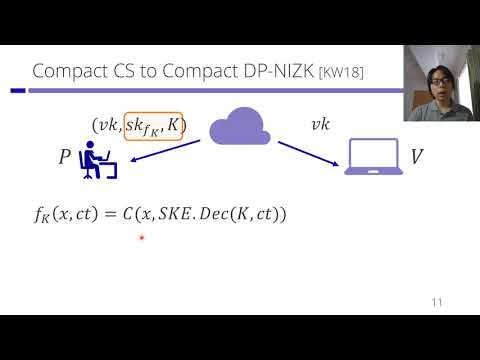CryptoDB
Compact NIZKs from Standard Assumptions on Bilinear Maps
| Authors: |
- Shuichi Katsumata , AIST
- Ryo Nishimaki , NTT Secure Platform Laboratories
- Shota Yamada , AIST
- Takashi Yamakawa , NTT Secure Platform Laboratories
|
| Download: |
- DOI: 10.1007/978-3-030-45727-3_13
(login may be required)
- Search ePrint
- Search Google
|
|
Conference:
|
EUROCRYPT 2020
|
| Abstract: |
A non-interactive zero-knowledge (NIZK) protocol enables a prover to convince a verifier of the truth of a statement without leaking any other information by sending a single message. The main focus of this work is on exploring short pairing-based NIZKs for all NP languages based on standard assumptions. In this regime, the seminal work of Groth, Ostrovsky, and Sahai (J.ACM'12) (GOS-NIZK) is still considered to be the state-of-the-art. Although fairly efficient, one drawback of GOS-NIZK is that the proof size is multiplicative in the circuit size computing the NP relation. That is, the proof size grows by $O(|C|k)$, where $C$ is the circuit for the NP relation and $k$ is the security parameter.
By now, there have been numerous follow-up works focusing on shortening the proof size of pairing-based NIZKs, however, thus far, all works come at the cost of relying either on a non-standard knowledge-type assumption or a non-static $q$-type assumption. Specifically, improving the proof size of the original GOS-NIZK under the same standard assumption has remained as an open problem.
Our main result is a construction of a pairing-based NIZK for all of NP whose proof size is additive in $|C|$, that is, the proof size only grows by $|C| +poly(k)$, based on the decisional linear (DLIN) assumption. Since the DLIN assumption is the same assumption underlying GOS-NIZK, our NIZK is a strict improvement on their proof size.
As by-products of our main result, we also obtain the following two results: (1) We construct a perfectly zero-knowledge NIZK (NIPZK) for NP relations computable in NC1 with proof size $|w|poly(k)$ where $|w|$ is the witness length based on the DLIN assumption. This is the first pairing-based NIPZK for a non-trivial class of NP languages whose proof size is independent of $|C|$ based on a standard assumption. (2) We construct a universally composable (UC) NIZK for NP relations computable in NC1 in the erasure-free adaptive setting whose proof size is $|w|poly(k)$ from the DLIN assumption. This is an improvement over the recent result of Katsumata, Nishimaki, Yamada, and Yamakawa (CRYPTO'19), which gave a similar scheme based on a non-static $q$-type assumption.
The main building block for all of our NIZKs is a constrained signature scheme with decomposable online-offline efficiency. This is a property which we newly introduce in this paper and construct from the DLIN assumption. We believe this construction is of an independent interest. |
Video from EUROCRYPT 2020
BibTeX
@inproceedings{eurocrypt-2020-30201,
title={Compact NIZKs from Standard Assumptions on Bilinear Maps},
booktitle={39th Annual International Conference on the Theory and Applications of Cryptographic Techniques, Zagreb, Croatia, May 10–14, 2020, Proceedings},
series={Lecture Notes in Computer Science},
publisher={Springer},
keywords={non-interactive zero-knowledge;DLIN;attribute-based encryption;constrained signature},
volume={12105},
doi={10.1007/978-3-030-45727-3_13},
author={Shuichi Katsumata and Ryo Nishimaki and Shota Yamada and Takashi Yamakawa},
year=2020
}

